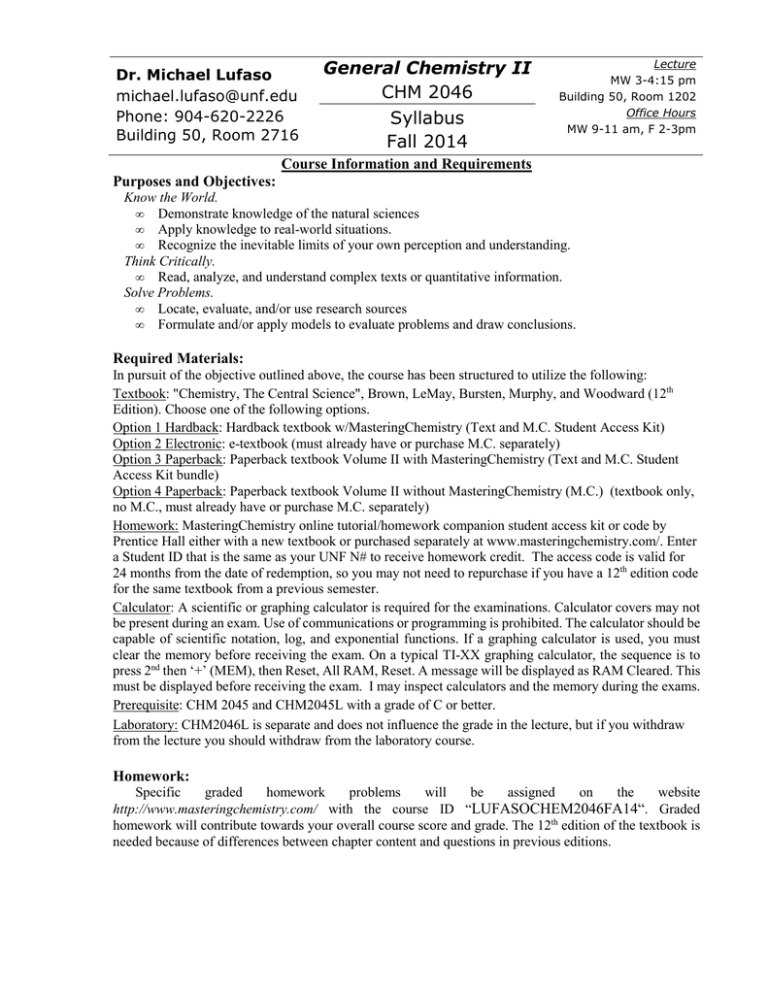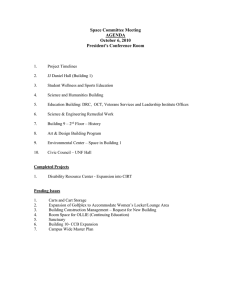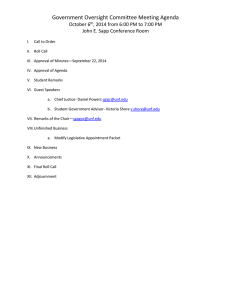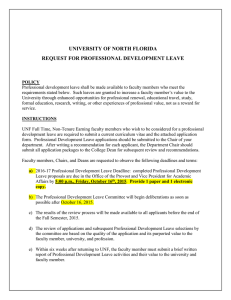General Chemistry II CHM 2046 Syllabus Fall 2014
advertisement

Dr. Michael Lufaso michael.lufaso@unf.edu Phone: 904-620-2226 Building 50, Room 2716 General Chemistry II CHM 2046 Syllabus Fall 2014 Lecture MW 3-4:15 pm Building 50, Room 1202 Office Hours MW 9-11 am, F 2-3pm Course Information and Requirements Purposes and Objectives: Know the World. • Demonstrate knowledge of the natural sciences • Apply knowledge to real-world situations. • Recognize the inevitable limits of your own perception and understanding. Think Critically. • Read, analyze, and understand complex texts or quantitative information. Solve Problems. • Locate, evaluate, and/or use research sources • Formulate and/or apply models to evaluate problems and draw conclusions. Required Materials: In pursuit of the objective outlined above, the course has been structured to utilize the following: Textbook: "Chemistry, The Central Science", Brown, LeMay, Bursten, Murphy, and Woodward (12th Edition). Choose one of the following options. Option 1 Hardback: Hardback textbook w/MasteringChemistry (Text and M.C. Student Access Kit) Option 2 Electronic: e-textbook (must already have or purchase M.C. separately) Option 3 Paperback: Paperback textbook Volume II with MasteringChemistry (Text and M.C. Student Access Kit bundle) Option 4 Paperback: Paperback textbook Volume II without MasteringChemistry (M.C.) (textbook only, no M.C., must already have or purchase M.C. separately) Homework: MasteringChemistry online tutorial/homework companion student access kit or code by Prentice Hall either with a new textbook or purchased separately at www.masteringchemistry.com/. Enter a Student ID that is the same as your UNF N# to receive homework credit. The access code is valid for 24 months from the date of redemption, so you may not need to repurchase if you have a 12th edition code for the same textbook from a previous semester. Calculator: A scientific or graphing calculator is required for the examinations. Calculator covers may not be present during an exam. Use of communications or programming is prohibited. The calculator should be capable of scientific notation, log, and exponential functions. If a graphing calculator is used, you must clear the memory before receiving the exam. On a typical TI-XX graphing calculator, the sequence is to press 2nd then ‘+’ (MEM), then Reset, All RAM, Reset. A message will be displayed as RAM Cleared. This must be displayed before receiving the exam. I may inspect calculators and the memory during the exams. Prerequisite: CHM 2045 and CHM2045L with a grade of C or better. Laboratory: CHM2046L is separate and does not influence the grade in the lecture, but if you withdraw from the lecture you should withdraw from the laboratory course. Homework: Specific graded homework problems will be assigned on the website http://www.masteringchemistry.com/ with the course ID “LUFASOCHEM2046FA14“. Graded homework will contribute towards your overall course score and grade. The 12th edition of the textbook is needed because of differences between chapter content and questions in previous editions. Tentative Schedule and Lecture Topic Coverage: Week 1 2 3 4 5 6 7 Aug. 25, 27 Sep. 1, 3 Sep. 8, 10 Sep. 15, 17 Sep. 22, 24 Sep. 29, Oct. 1 Oct. 6, 8 8 9 10 Oct. 13, 15 Oct. 20, 22 Oct. 27, 29 11 12 13 14 15 Nov. 3, 5 Nov. 10, 12* Nov. 17, 19 Nov. 24, 26 Dec. 1, 3 E Final Lecture Topic intermolecular forces, phase changes, H-bonding Phase changes, phase diagrams, colligative properties, solids Polymers, solution processes, concentration Kinetics, integrated rate laws, activation energy Reaction quotient, calculating equilibrium constant Le Chatelier's principle, acids and bases Autoionization of water, pH, acid and base dissociation constants, Ka and Kb, Lewis acid and base Common ion effect, buffers Titrations, pH changes in buffers pH changes in buffers, titrations weak acid/base and strong base/acid solubility equilibria, Entropy, laws of thermodynamics Gibbs free energy, Voltaic, galvanic cells, cell EMFs balancing redox reactions, free energy, Nernst equation, electrolysis, nuclear equations, nuclear stability, nuclear kinetics, fission, fusion, radiation health and safety Final Exam: Monday, December 8, 2014 (3:00 pm - 4:50 pm) Reading 11 11,12 12,13 13, 14 14 15 16 16,17 17 17 17, 19 19,20 20 21 Labor Day 9/1, Thanksgiving 11/27-28 (offices are closed and no classes are held). *Last day to withdraw is Friday, October 31, 2014. Websites for Additional Information: http://www.unf.edu/~michael.lufaso/chem2046/ http://blackboard.unf.edu/ http://www.masteringchemistry.com/ Exams: Term exams (3) are scheduled on September 24, October 27, and November 26. The final exam is scheduled on Monday, December 8, 2014 (3:00 pm - 4:50 pm). UNF ID cards may be requested at an exam. Bring an approved calculator, without a cover, to all exams. No make-up midterm or final exams will be given. If you miss an exam for extraordinary reasons beyond your control, it must be documented within 2 days by official documentation (e.g. police report/emergency room receipt), and if approved you will receive a grade that is the average of your other exams. Absences for other reasons are not excused and result in a grade of 0. Grading and Evaluation: Your performance and final grade in the course will be evaluated on the basis of distribution total points earned. Prerequisite knowledge assignment 25 pts. Homework 250 pts. Term Exam I 150 pts. Term Exam II 150 pts. Term Exam III 150 pts. Final Exam 275 pts. Total 1000 pts. The course will be graded so that A: 92 - 100%; A-: 89 – 92%; B+: 87 - 89%; B: 80 – 87; B-: 78-80; C+: 76 - 78%; C: 68 – 76%; D: 55 - 68%. +/- final grades will be assigned. Retain all graded papers so that you can present them if you become aware of a grade recording error. Accommodations Students with disabilities who seek reasonable accommodations in the classroom or other aspects of performing their coursework must first register with the UNF Disability Resource Center (DRC) located in Building 57, Room 1500. DRC staff members work with students to obtain required documentation of disability and to identify appropriate accommodations as required by applicable disability laws including the Americans with Disabilities Act (ADA). After receiving all necessary documentation, the DRC staff determines whether a student qualifies for services with the DRC and if so, the accommodations the student requires will be provided. DRC staff then prepares a letter for the student to provide faculty advising them of approved accommodations. For further information, contact the DRC by phone (904) 620-2769, or visit the DRC website (http://www.unf.edu/drc/). Military and veteran students who return from combat exposure may be utilizing the post 9/11 GI bill to continue postsecondary education goals and may need both physical and academic accommodations. Contact the Director of Military and Veterans’ Resource Center by phone (904) 620-2655 or visit the MVRC website www.unf.edu/militaryveterans/. Course Format: It is assumed all students will be in class on time and remain until dismissed. If you are late, do not enter at the front of the classroom, use the doors at the rear of the lecture hall. Avoid disruptive behavior such as using cell phones, tablets, or laptops. Students that are caught texting or have a cell phone or electronic device that makes noise during class may receive a 1% penalty, per occurrence, to their overall course score. Policy on Academic Integrity: A zero tolerance policy will be in effect. If you haven’t already done so, you should familiarize yourself with UNF’s academic policies and regulations, especially those dealing with academic integrity. The UNF undergraduate catalog http://www.unf.edu/catalog/ and the student handbook http://www.unf.edu/ombudsman/Student_Handbook.aspx contain more details regarding the Academic Integrity Code and possible faculty actions in a case of suspected academic misconduct. Helpful Suggestions: The Academic Center for Excellence (ACE) offers tutoring for students. ACE is located in Building 2, room 1200. For more information please visit http://www.unf.edu/ace/ or call 620-1012 or e-mail ace@unf.edu. It is recommended that reading of the pertinent chapter sections is completed prior to each class meeting time. Chemistry, in particular, is a cumulative subject in which new material builds upon a series of linked concepts. Practice is critical. Keep up in chapter reading and homework problems and don’t fall behind. Procrastination, following by “all-nighters” often lead to lack of success. Consistent effort will likely yield the best results. The lecture class and textbook are intended to complement each other and you are responsible for everything that is covered during the lecture class period. Lectures may utilize PowerPoint slides, but please note that merely watching and copying what is on the slides is not sufficient as class notes – you should also take notes on verbal explanations which accompany the slides. Take quality notes and review them periodically in the context of the textbook. Plan to spend at least 3 hours outside of class for every 1 hour lecture; some students may need more or less time. Make sure you understand the material and can do the problems independently, then consider study groups to learn difficult subject material. Learn from each other, but remember that you will not be taking exams or working on graded homework as a group. Attempt the problems first, before looking at the solutions. More practice and study of the problems, concepts, and material will help you on exams - since you will be able to answer questions more rapidly and have time to check your answers and calculations. Consider going to the library to obtain other general chemistry books for additional practice problems. When appropriate, ask lab instructors about content that overlaps with the lecture. Students who feel they are not achieving their highest level of success in this course are also encouraged to seek help during office hours. I desire to have each of you learn chemistry according to your ability and also enjoy the course. Your success in this course will largely depend on your own effort and motivation!


